By Greg Zyla —
I received two letters recently dealing with numbers matching collector cars versus ‘fake’ collector cars that include tribute and clone cars and intentional ‘fraud’ collector cars that are sold as ‘original number matching’ vehicles.
Fake and fraud collector cars continue to be a problem in our hobby, as many are exposed only after an enthusiast has paid for a vehicle.
Back in 2017, I answered a question from James Fedrick from Spokane, Washington, explaining the differences between numbers-matching cars, tribute, and clone collector cars. Here in 2025, I expand those adjectives to include the now disastrous ‘fraud’ collector car, clearly the worst of the bunch mentioned above.
Here’s that letter, with an updated answer to include the fraud collector car.
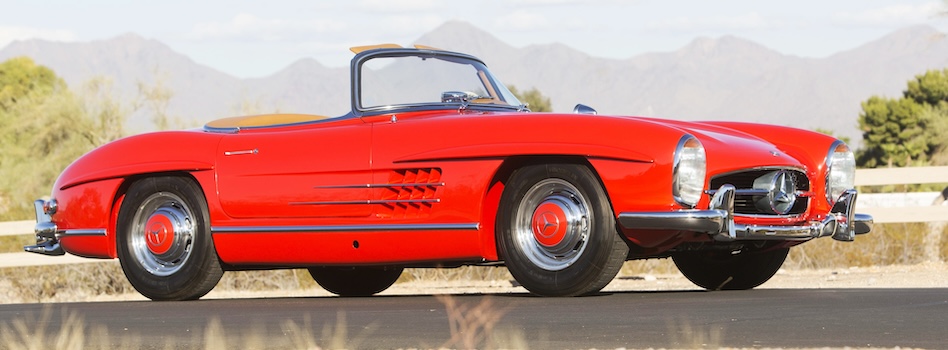
This 1961 Mercedes 300SL was sold for $1.74 million by a German restoration company, but it turned out to be a fraudulent duplicate car. (Mercedes)
Q: Greg, I just read your story on John and Nickie Miller’s 1969 Pontiac GTO. After reading it, I’m a bit confused (which isn’t that unusual).
The owners claim that their car is a “tribute” GTO Judge, seemingly because it doesn’t have the original engine or is otherwise a non-numbers matching collector car.
Now, I’ve always thought that “tribute” in this hobby means fake. For example, someone takes a Mustang Fastback, paints it black with gold stripes, slaps on Shelby GT350 side stripes and emblems and everything makes it look like a real Shelby. But they call it a “tribute” or a “clone” car.
In the Miller’s GTO case, did they take an ordinary ’69 GTO and slap on the other drivetrain parts? If it’s a real Judge, then it’s not a tribute even with the wrong engine. It’s the real deal.
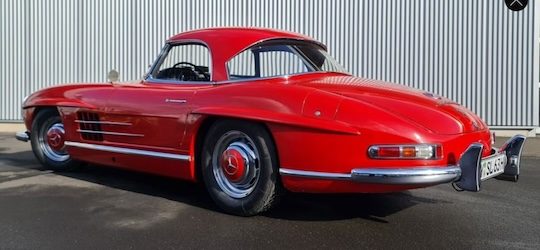
Rear view of the 1961 Mercedes 300SL sold as a numbers-matching original. A duplicate chassis plate revealed the car was a fraud. (Mercedes)
Maybe you can do us car lovers a service by doing an article on what exactly is a tribute or clone car. I am sure many of us would appreciate it.
I’m 67 years old now and have many memories of “back in the day.” I was there! James Fedrick, Spokane, Wash.
A: (Updated Feb. 2, 2025) James, thanks for your handwritten letter and your questions about tribute, fake, and clone collector cars. In the case of the Miller’s outstanding 1969 GTO Judge, it is not a real Judge according to the vehicle identification number (VIN), thus it is a tribute/clone built from a genuinely nice 1969 GTO. However, with this said and even though it is not a numbers matching Judge, the car is as close to a real Judge as you can get.
However, I must start with the latest info on fraud collector cars, a subject we didn’t touch on seven years ago. Specifically, fraud cars are rebuilt to mimic an original, numbers matching collector car. This is now the worst of the collector car bunch, as the owners that sell these frauds are out solely for one reason: to rip off unknowing car hobby enthusiasts.
Selling a car as a “numbers matching original” when it is not is true fraud. This practice involves falsifying the authenticity of a vehicle’s parts, which knowingly impacts the car’s value and, worst of all, is done to deceive buyers. When new owners discover that the car is not original, it most likely ends up in litigation and other legal disputes.
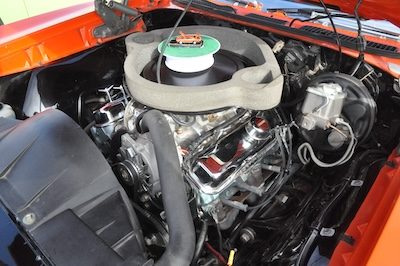
Under the hood of Miller’s 1969 Judge sits a Ram Air III induction system that was standard on the Judge that year. (Greg Zyla)
This fraud problem in our collector car hobby is now more common than when I answered this question in 2017. Unfortunately, it seems to be growing. The market’s high value and difficulty of verifying a car’s history make our hobby/business vulnerable to fakes, forgeries, and falsifications. While most sales are legitimate, the dishonest seller is indeed out there looking to cash in on an enthusiast’s vulnerability.
A prospective buyer of a “numbers matching” car must find a way to engage in due diligence before the purchase and verify VIN numbers and documentation. If you suspect fraud, you may want to seek legal advice or contact specialized insurance providers that can help.
As for statistics, Hagerty Media, a leader in collector car insurance, is proactive in dealing with this crime of fraudulent cars. See www.hagerty.com for more information).
Hagerty Media estimates that there are 45 million collector vehicles in the United States, collectively worth around $1 trillion. The high value of these vehicles makes them attractive targets for fraud.
In 2022, collector car auctions in North America alone totaled $3.48 billion, indicating the significant financial stakes involved.
Fraudulent activities range from minor misrepresentations to full-blown forgery and identity theft. For example, a recent case involved a $1.74 million Mercedes-Benz 300SL with a duplicated chassis number.
The fraudulent 1961 Mercedes-Benz 300SL was sold in May of 2023 through Kienle Automobiltechnik, a Germany-based restoration shop near Stuttgart. The car was sold for $1.74 million USD, and the fraud was discovered when the new owner attempted to register the car in Germany. It turned out that another 300SL with the same chassis number had already been registered.
The case led to an ongoing investigation by German authorities, and Kienle is facing serious allegations of creating duplicate vehicles. The charge is commercial fraud with the sale of fake classic cars.
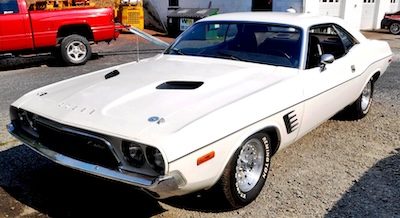
Zyla’s 1972 Dodge Challenger R/T Tribute, a fine-looking muscle car. The R/T big block versions were available from 1970 to 1971, making Greg’s car a tribute version. (Greg Zyla)
Back to the original explanation of tribute, clone and fake. All three of these terms have been used by car collectors for decades, but clone is now less popular in the collector dictionary and many times replaced by tribute. The word fake was always the most unpopular for a non-numbers matching car and used mostly when an owner was trying to pass off his car as “original numbers matching.” It is now shared/replaced with the word fraud.
To explain what a tribute is, I have a 1972 Dodge Challenger R/T tribute, powered by a high performance 440 (plus .40) TNT engine that came out of a 1969 Chrysler. Considering the big block engine was not available in 1972 Challengers, nor was an R/T model, most everyone I run into knows this is a tribute car. So, a tribute can be any car that is not original but mimics, in my case, an R/T from 1970 through 1972.
In my opinion (which I stress), this is where a clone is different from a tribute, and in many cases, a more desirable car even though the word clone is many times replaced by tribute at the car shows.
In my dictionary, a clone is a car that is correctly representative of the year it was produced but does not have the correct numbers matching engine/transmission, and or a few other ancillary parts. So, if someone has a 1967 Plymouth Belvedere, and puts a 426 Hemi engine in it, adds GTX badges, hood scoops, rear valance, exhausts, etc. with a 4-speed and Dana rear or a Torqueflite with an 8 ¾ rear, then this would be a nice GTX clone because you could go into a dealer back in 1967 and order one just like it. So, I’m still a fan of the word clone because it represents a car that was available in whatever year, unlike my Challenger, and includes the same mechanicals as a numbers-matching GTX. To me, the Miller’s GTO is also a top-quality tribute/clone in just about every manner.
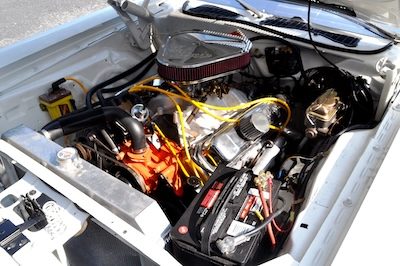
Under the hood of our author’s ’72 Challenger sits a 440 wedge with a .40 overbore, resulting in 451 cubic inches. (Greg Zyla)
Now, I must mention the Vehicle Identification Number (VIN) plate because this is also important. When you see what looks like a bucket of bolts or a rusted, junk car being sold for $15,000, it’s because the VIN designates it as a real, rare muscle car like the above-mentioned 1967 GTX Hemi. Whoever buys it can put it back together in the original form, with a numbers-matching replacement Hemi engine from 1967 and a correct transmission that relates to 1967. When finished, the new owner can advertise the car as a ’67 GTX using 1967 parts, and then explain to the new owner it is a correct replacement engine and not the one that came in the car.
So, can you call this GTX example as numbers matching? Some say yes, others no, but the car is worth quite a bit more on the market regardless of its nomenclature because it has the correct VIN. To me, it’s not a true numbers-matching original, but close to it.
I realize this week’s column is a bit confusing, but the hobby pretty much identifies and monitors cars that fall into these categories. Proper money values are attached to tribute, clone, correct, and numbers-matching efforts. To assist, there are many professional appraisers like MOPAR’s Galen Govier, who can tell you quickly for a fee exactly what you are attempting to buy or have sitting in your garage. To me, an original numbers-matching car is the ultimate, but right now I’m happy to have a Challenger R/T tribute in my garage.
In ending, be it tribute, numbers matching, or clone, the hobby is still growing eight years after I originally answered James’ letter and is stronger than ever. Thank you, Hagerty, for the info on fraud cars.
(Greg Zyla is a syndicated auto columnist who welcomes reader input on collector cars, auto nostalgia or motorsports at extramile_2000@yahoo.com or greg@gregzyla.com.)

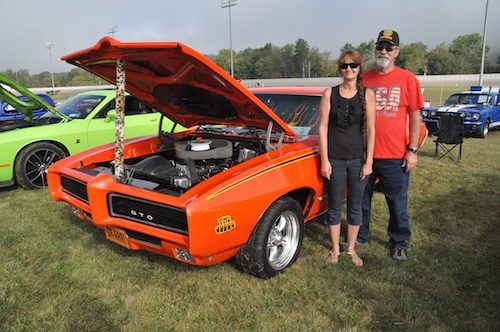

Be the first to comment on "Collector Car/Cars We Remember; Fraudulent collector cars? You bet, and it’s a growing concern"